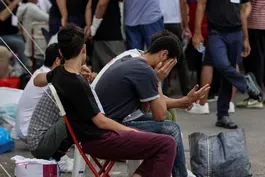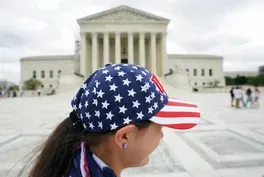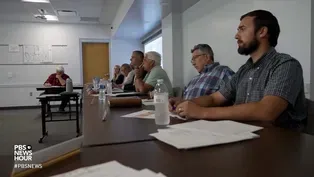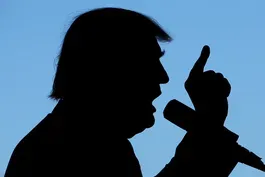
Analyzing major decisions expected from the Supreme Court
Clip: 6/21/2023 | 6m 35sVideo has Closed Captions
Major decisions expected from Supreme Court could reshape education and immigration policy
Major decisions expected from the Supreme Court in the coming days could reshape higher education and immigration policy. Geoff Bennett discussed the cases with NewsHour Supreme Court Analyst Marcia Coyle.
Problems with Closed Captions? Closed Captioning Feedback
Problems with Closed Captions? Closed Captioning Feedback
Major corporate funding for the PBS News Hour is provided by BDO, BNSF, Consumer Cellular, American Cruise Lines, and Raymond James. Funding for the PBS NewsHour Weekend is provided by...

Analyzing major decisions expected from the Supreme Court
Clip: 6/21/2023 | 6m 35sVideo has Closed Captions
Major decisions expected from the Supreme Court in the coming days could reshape higher education and immigration policy. Geoff Bennett discussed the cases with NewsHour Supreme Court Analyst Marcia Coyle.
Problems with Closed Captions? Closed Captioning Feedback
How to Watch PBS News Hour
PBS News Hour is available to stream on pbs.org and the free PBS App, available on iPhone, Apple TV, Android TV, Android smartphones, Amazon Fire TV, Amazon Fire Tablet, Roku, Samsung Smart TV, and Vizio.
Providing Support for PBS.org
Learn Moreabout PBS online sponsorshipGEOFF BENNETT: We're going to shift our focus now to the remaining major decisions we're expecting from the court, including ones that could reshape higher education and immigration policy.
For that, we turn to the "NewsHour"'s Supreme Court analyst, Marcia Coyle.
Thanks for coming in.
MARCIA COYLE: My pleasure, Geoff.
GEOFF BENNETT: So, we have got a handful of big cases left.
Many see the most significant one being the affirmative action case, which centers on whether colleges and universities can continue to consider race as part of their admissions decisions.
Remind us, who brought this case, and what core arguments are the justices weighing?
MARCIA COYLE: Well, this case really is the project of one person, Ed Blum, who has been fighting racial preferences of all kinds for a long time.
And what he does is, he's not a lawyer, but he goes out and he finds someone to challenge the preference.
He hires the lawyers, pays the lawyers.
He was behind the court's major decision striking down a key section of the Voting Rights Act in 2013.
And he created the -- the organization Students For Fair Admissions that brought the challenge to the Harvard admissions policy and the University of North Carolina's admissions policy.
So they got to the Supreme Court, and the charge is that these two colleges are discriminating against whites, Asian Americans, and Native Americans, Harvard, in particular, discrimination against Asian Americans.
The lower courts found against them after really detailed trials and looks at the policies involved.
But they came back to the Supreme Court.
And, this time, they're asking the court to basically throw out the key precedents that have upheld the use of race as a factor in a holistic examination of each applicant to the college.
GEOFF BENNETT: We are also expecting a ruling on President Biden's student loan forgiveness plan.
It's worth noting that one in five adults have student loan debt, and 92 percent of student loans are through the federal government.
There was a question as to whether the plaintiffs in this case had legal standing.
How might that affect the outcome?
MARCIA COYLE: This is a very serious question.
The states that have brought the challenges, they're red states led by Republican governors, and two individuals who brought a separate challenge, whether they actually have what the court requires for standing, and that is a concrete injury.
And it really is very attenuated here, especially for the two individuals who brought the suit out of Texas.
So it could kill the case.
If the justices decide that they don't have standing, the case will be gone.
GEOFF BENNETT: There's also a pair of immigration cases that could affect deportation proceedings.
Tell us about that.
MARCIA COYLE: Well, Geoff, to me, this case is a lot like a federal agency being between a rock and a hard place.
Right now, both sides agree.
The two states that have brought the challenge to the Department of Homeland Security's so-called guidance believe -- agree that Congress has never given the department the resources it needs to seek, detain and deport 11 million undocumented immigrants in this country.
So what's the department to do?
It came up with a guidance that prioritizes who they really should be going after, most likely serious criminals, people with terrorist backgrounds, perhaps also repeat people who come in and out, in, and then get deported, come back illegally, get deported again.
But Texas and Louisiana claim that this guidance violated the Administrative Procedures Act, that the department didn't follow the rules for putting out the guidance, and that the statute, the immigration law, says clearly that the department must detain and deport these undocumented immigrants.
The court has to take a look here at the realities, as well as what the language of the statute is, and whether Texas and Louisiana really have an injury here if the guidance goes into effect.
GEOFF BENNETT: Marcia, one of the rulings we're waiting for focuses on this legal theory that could limit the ability of state courts to review election laws passed by state legislatures?
Unpack that for us.
MARCIA COYLE: Yes, North Carolina has pressed this theory that its Supreme Court and -- has no authority whatsoever to look at what North Carolina does with elections, and that includes redistricting.
The North Carolina Supreme Court said, uh-uh, no, this is not constitutional and ruled against them.
They came, the state came to the Supreme Court to argue this theory.
In the meantime, the North Carolina Supreme Court switched from being Democratic-led to Republican-led.
And the Republican-led North Carolina Supreme Court reversed the ruling of the Democratic-led Supreme Court.
So, the U.S. Supreme Court has a bit of a mess on its hand to decide whether this case is moot and should be dismissed or whether it should continue and rule on the merits, because this theory may come up again at some point.
So we have to wait and see what they do with it.
GEOFF BENNETT: As we reach the end of yet another term, public confidence in the court is waning.
It sits at historic lows.
The court is facing fresh ethics controversies.
Why hasn't the Supreme Court come up with its own code of ethics?
MARCIA COYLE: Well, you will hear a variety of reasons.
They say there are separation of powers concerns, especially if Congress were to mandate or come up with its own code for them.
They say there are recusal problems.
This is a court of nine justices.
If one has to step aside, eight are left, and that really heightens the risk of deadlocked decisions.
It doesn't seem to many that these are insurmountable obstacles.
I don't know, Geoff.
I sit and think, gee, why don't you just adopt one?
And it would really sort of lower the temperature for a while, at least.
So, I really -- I really don't know.
Well, I'm sure we will learn more after the news today.
(LAUGHTER) GEOFF BENNETT: Yes, one imagines.
Marcia Coyle, thanks so much.
MARCIA COYLE: My pleasure, Geoff.
Alito faces scrutiny over undisclosed luxury trip from donor
Video has Closed Captions
Clip: 6/21/2023 | 6m 10s | Supreme Court Justice Alito faces scrutiny over undisclosed luxury trip from GOP donor (6m 10s)
Boat disaster renews criticism of immigration policies
Video has Closed Captions
Clip: 6/21/2023 | 5m 45s | Deadly migrant boat disaster renews criticism of immigration policies in Greece (5m 45s)
More ships join search for sub after report of banging noise
Video has Closed Captions
Clip: 6/21/2023 | 4m 31s | More ships, equipment joining search for missing sub after reports of banging noises (4m 31s)
Poll shows Americans' trust in Supreme Court remains low
Video has Closed Captions
Clip: 6/21/2023 | 4m 53s | Poll shows Americans' trust in Supreme Court remains low (4m 53s)
School boards become battlegrounds for nation's divisions
Video has Closed Captions
Clip: 6/21/2023 | 13m 8s | School boards become battlegrounds for nation's divisions on race, gender and more (13m 8s)
Trump business deal with Oman raises new ethical questions
Video has Closed Captions
Clip: 6/21/2023 | 5m 41s | Trump's business deal with Oman raises new ethical questions (5m 41s)
Providing Support for PBS.org
Learn Moreabout PBS online sponsorshipSupport for PBS provided by:
Major corporate funding for the PBS News Hour is provided by BDO, BNSF, Consumer Cellular, American Cruise Lines, and Raymond James. Funding for the PBS NewsHour Weekend is provided by...
















